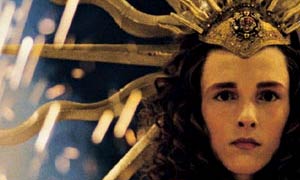

|
The King Dances
2 out of 10 |
 |
|
The Unchecked Extravagance of an Autocrat It is doubtful that any film has ever mangaed to fuel all the worst prejudices of the public about "arthouse" like "The King Dances" ("Le Roi Danses"). For an interminable 115 minutes, overly intense characters played by unknown actors stride about this this lavish French costume drama, subtitled in English with a script whose subplots make the human DNA look like a piece of cake to understand. It truly is everything you feared and amply explains why Hollywood can endlessly keep churning out police dramas and superhero flicks like sausages that fill our screens with tumbling cars and grisly shootouts. There can be little doubt of Louis XIV's importance to both French culture and world history. Born late in life to Louis XIII, the young prince knew little of his father who died in his childhood and was to enjoy scant love from his manipulative mother. Effectively booting her, her corrupt cronies and religious extremists out in a bloodless coup d'etat, this lonesome man trusted no-one and so established an utterly absolute monarchy, unchecked by any form of Government with the intent to try to open a new glorious era in French history. Having been given no authority by her to run anything but the music in his life before the age of 22, he turned to those in the arts to lead his nation into a glittering new future of enlightenment. By his death he had indeed bedazzled the world with creations such as the fabulous Palace of Versailles and inspired some of the greatest artists and writers of French culture. And the price for building the largest Empire in Western Europe? It's biggest debt. Over the 100 years of so after his death, neither of his two successors would be able to manage this unwieldy morass. Choosing to issue ever more bonds to finance the interest on those already issued, they would create an unbreakable spiral all the way up to mindblowing 20% per annum. The inevitable truly awesome financial crash that resulted would see the Bastile stormed the next day and a revolution that would send both the nobility and the royalty to an inevitable appointment with the guillotine. Like Louis XIV before him, Belgium director Gérard Corbiau powers ahead autocratically with his artistic extravaganza, totally deaf to desires of the public. In flashback, we follow influence of Jean Baptiste-Lully (Boris Terral), the composer who writes dances and music for Louis (Benoît Magimel and Emil Tarding) from a child to Baptiste's death from gangrene. Skipping inconvenient historical distractions like three major wars, a mass revolt and the fact that Louis put Baptiste in charge of the economy, an appointment that is as inspired as asking your postman to do brain surgery on you, Gérard Corbiau follows the tale of this closet homosexual who dearly adored his monarch, not only as a subject, but more as a crazy stalker. He loyally serves him, regardless of all the intrigue and scandal that surrounds the monarch and jealously pushes aside any others who stand between them, including, finally, even his old friend, the famed comic theatrical writer, Molière, a role filled by every American's idea of a Frenchman, Tchéky Karyo who brings what little life and humour there is. One would have thought that spending millions on an army of top flight set and costume designers would seem a waste of time by cuting corners by employing cameramen who keep losing control of the focus, but this is a concept alien to Gérard Corbiau. Likewise, cutting out scenes critical to the story to preserve the eye candy would seem senseless to we mere mortals, but various lookalike females just keep falling into bed with vast array of characters in the resultingly choppy and disjointed plot. As we peer through the all-purvasive gloom that shrouds the key moments to struggle to decypher the white subtitles on a white background, often also out of focus, we are no better informed.With all its fabulous recreation of the period, watching "Le Roi Danses" feels like swimming through treacle. "Le Roi Danses" is not only
a turgid revisionist history lesson on the extravagance
of the absolutism of the French royalty, but also one of a French film
industry that cares so little for those whose buying the tickets. Raking
in a laughable $772,148 at the box office for a production that set
the industry back $21,000,000 to make, would leave any Hollywood director
offering you fires and a Coke with your Burger in his next assignment.
In France, though, where culture comes before the wishes of the taxpaying
and ticket-buying public who funded it, Catherine Tasca (Minister of
Culture and Communication) was only too happy to hand make Gérard
Corbiau an "Officier de l'Ordre des Arts et des Lettres" on
February 6, 2001 for the unchecked extravagance of this autocratic director.
Funny thing is, didn't there used to be a King like that once? Film Critic: Robert L Thompsett
|
|